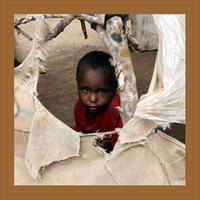UN Coordinator for Somalia concerned population still being displaced

The United Nations Humanitarian and Resident Coordinator a.i., Mr. William Paton, traveled to Afgooye yesterday to visit one of the main areas of population displacement and ongoing humanitarian activities in Somalia.
Mr. Paton visited three different sites out of the more than 100 informal settlements set up along the 15-kilometer corridor. There are now more than 200,000 internally displaced people who have fled the fighting in Mogadishu and set up shelters on the route between Mogadishu and Afgooye. The rate of displacement from Mogadishu has averaged about 25,000 per month in January and February, and the total number of people in need of assistance in 2008 has risen to 1.8 million to 2 million country-wide.
“I spoke to one woman with her children who had just arrived the day before from Mogadishu, about 20 km away. She said that recent mortar fire falling in Bakara market had been the last straw for her and she had finally decided to flee,” said Mr. Paton. “That particular location still has scores of new families arriving every day,” he added.
Deteriorating security in Somalia over the past months has further aggravated efficient response to one of the gravest humanitarian situations in the world. While several missions to Afgooye had to be cancelled during February due to security concerns, the United Nations has just set up a nearby operational base at the K-50 airstrip which will allow international staff to stay overnight. Until now, staff members based elsewhere had to rely on flying in for one-day missions.
“Somalia is the most difficult place in the world for humanitarians to do their job, due to the evershifting insecurity,” noted Mr. Paton. “We are going to continue to work hard to improve security for our staff members and thus deliver more,” he added.
One serious security concern is the staggering number of checkpoints – nearly 400 throughout the country – that are often points of insecurity where humanitarian convoys are often subject to harassment, threats and violence. In just the first two months of the year there have been nine shooting incidents at checkpoints. On the Mogadishu to Afgooye road, eight separate checkpoints are set up and convoys were being charged from $50 to $150 for every 35 metric tons of cargo.
Despite the challenges, a massive humanitarian response is underway. More than 2 million litres of clean water are being trucked to the Afgooye IDPs every day. One organization even uses donkeys to deliver water off road. Long term solutions, such as constructing boreholes and water catchments, are needed. Approximately 200,000 people are receiving food. Twenty-eight tented classrooms have been set up, with more on the way.
With the rainy season a month away and the potential for cholera and other outbreaks high, hygiene awareness campaigns and the distribution of soap, chlorine, aqua tabs and other supplies are ongoing. Some 56,000 children and 11,200 pregnant mothers have been immunised and mobile clinics are providing maternal and child health services.
 Back and Next - Back and Next
Back and Next - Back and Next See Also - See Also
See Also - See Also